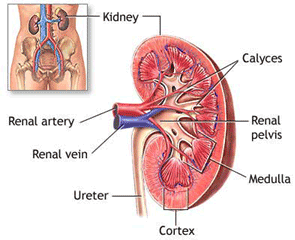Meta-analysis
Finds Tenofovir Linked to Modest Kidney Impairment, No Increase
in Bone Fractures
 |
 |
 |
 |
 |
 |
 |
| SUMMARY:
Use of tenofovir
(Viread, also in the Truvada
and Atripla
combination pills) was found to be associated with statistically
significant loss of kidney function in a systematic
review and meta-analysis, but this was considered to
have only a modest clinical impact, researchers reported
in the September
15, 2010 issue of Clinical Infectious Diseases.
This review also found no link between tenofovir and
bone fractures. Researchers concluded that tenofovir
use does not need to be limited in areas where kidney
function cannot be adequately monitored. |
|
 |
 |
 |
 |
 |
 |
 |
By
Liz Highleyman
 Tenofovir
and related drugs have the potential to cause kidney toxicity,
specifically damage to the tubules that filter blood and reabsorb
water, minerals and other substances. Kidney dysfunction was not
seen in the pivotal clinical trials leading to the drug's approval,
but these studies excluded people with known pre-existing kidney
problems. Several case reports and more recent studies have shown
a link between tenofovir use and impaired kidney function, but
others have not seen this association.
Tenofovir
and related drugs have the potential to cause kidney toxicity,
specifically damage to the tubules that filter blood and reabsorb
water, minerals and other substances. Kidney dysfunction was not
seen in the pivotal clinical trials leading to the drug's approval,
but these studies excluded people with known pre-existing kidney
problems. Several case reports and more recent studies have shown
a link between tenofovir use and impaired kidney function, but
others have not seen this association.
Individuals receiving tenofovir-containing antiretroviral
therapy (ART) regimens in high-income countries like the U.S.
are advised to receive regular kidney function monitoring, but
this may not be available in resource-limited regions, raising
questions about whether tenofovir is safe to use in such settings.
In the present study, Ryan Cooper from the University of Alberta
and colleagues aimed to determine the renal (kidney) safety of
tenofovir-containing antiretroviral regimens. They also looked
at bone fractures, since bone loss is another side effect associated
with tenofovir in some but not all studies.
The study authors performed a systematic medical literature review,
searching the MEDLINE, EMBASE, Global Health, Scopus, Biosis Previews,
Cochrane Library, and Web of Science databases, as well as previous
systematic reviews. They selected prospective studies comparing
tenofovir-containing versus non-tenofovir-containing ART regimens.
A total of 17 studies, including 9 randomized controlled trials,
met the selection criteria. The total number of participants was
10,889, with a median study sample size of 517 (range 49 to 3439).
The researchers collected data on study design, participant characteristics,
therapeutic interventions, kidney function, bone density, and
fracture rates. The median follow-up duration was 48 weeks.
Selected studies included both treatment-naive and treatment-experienced
participants. A majority were men (60%-100%) and the average age
ranged from about 35 to 45 years. 11 studies used Cockcroft-Gault
creatinine clearance (CG) and 6 used the MDRD equation to calculate
glomerular filtration rate (GFR), an indicator of kidney function;
the CG method is better able to detect mild kidney impairment.
Results
 |
Overall,
tenofovir recipients showed significantly greater loss of
kidney function compared with patients taking other antiretroviral
drugs. |
 |
Kidney
impairment was more likely to occur among treatment-experienced
patients compared with those just starting ART. |
 |
Tenofovir
use was associated with significantly greater kidney impairment
using the Cockcroft-Gault GFR method (average difference of
3.92 mL/min). |
 |
Tenofovir
was associated with slightly worse MDRD GFR, but the difference
did not reach statistical significance (average difference
of 2.56 mL/min). |
 |
Patients
taking tenofovir also had a higher rate of acute kidney failure,
but the overall risk was small (risk difference 0.7%). |
 |
However,
there was no evidence that tenofovir use led to increased
risk of chronic kidney disease, end-stage kidney disease requiring
dialysis, severe proteinuria (protein in the urine), or hypophosphatemia
(low blood phosphate level). |
 |
In
the 2 studies that reported bone fracture rates, tenofovir
recipients did not have a higher risk of fractures. |
 |
Loss
of bone mineral density was also similar among tenofovir recipients
and people taking other antiretroviral drugs. |
"Although
[tenofovir] use was associated with a statistically significant
loss of renal function, the clinical magnitude of this effect
was modest," the study authors concluded. "Our findings
do not support the need to restrict [tenofovir] use in jurisdictions
where regular monitoring of renal function and serum phosphate
levels is impractical."
In their discussion, the investigators suggested that this review
may have found less kidney impairment than some prior studies
and case reports because participants in this analysis were generally
younger, did not have advanced HIV disease, were less likely to
have pre-existing kidney problems (such patients are typically
excluded from clinical trials), and were less likely to be taking
didanosine (ddI, Videx)
or ritonavir (Norvir),
which can also contribute to kidney toxicity.
Investigator
affiliations: Department of Medicine, Public Health Sciences,
and Division of Critical Care Medicine, University of Alberta,
Edmonton, Alberta, Canada; Center for Public Health Practice,
Arkansas Department of Health, Little Rock, AR; University of
Texas, Medical Branch, Galveston, TX; Department of Internal Medicine,
University of Witwatersrand, Johannesburg, South Africa.
9/14/10
Reference
RD Cooper, N Wiebe, N Smith, and others. Systematic review and
meta-analysis: renal safety of tenofovir disoproxil fumarate in
HIV-infected patients. Clinical Infectious Diseases 51(5):
496-505 (Abstract).
September 15, 2010.
